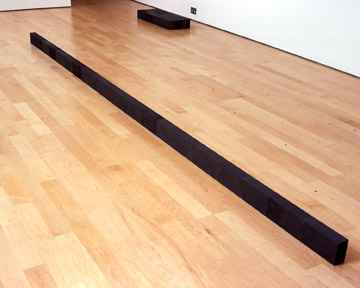Two exhibitions
dal 15/6/2005 al 28/8/2005
Segnalato da
15/6/2005
Two exhibitions
Kunsthalle Basel, Basel
Carl Andre is one of the main representatives of Minimal Art. He makes floor sculptures of units of different materials: metal plates, timber blocks and bricks. The exhibition presents new sculptures in the ground floor gallery. Artur Zmijewski's films are constructed as precise, quasi-documentary mise-en-scenes touching upon a variety of difficult questions in contemporary society. On show a selection of his latest films, which he himself describes as television reports.

Carl Andre – Artur Zmijewski
The American artist Carl Andre (born 1935) is one of the main representatives of
Minimal Art. He makes floor sculptures of units of different materials: metal
plates, timber blocks and bricks, such as the 1960s series Equivalents, each part of
which consists of 120 bricks in different arrangements. Andre has entered a dialogue
with the conventional concept of sculpture in a unique way. For him, a sculpture is
always a material reality that challenges the viewer by providing a physical and
sensual experience – affecting both the viewer and the space where it is located.
Andre uses the materials in their elementary, unchanged form, and insists on their
inherent sculptural potential. The artist has been similarly preoccupied with
language: he takes words or parts of sentences from existing texts, deconstructs
their original grammar and syntax, and then uses them as raw material for poetic
works of his own. Andre produces his poems by structuring the units of language. He
deals with units of matter in a similar way. The Kunsthalle Basel is delighted to be able
to present new sculptures by Carl Andre in the ground floor gallery. A catalogue in
German and English will follow the exhibition.
The Polish artist Artur Zmijewski (born 1966) confines himself to the media of
photography and film. He established his reputation with the photographic series
Eye for an Eye†(1998-2000) and the film of the same title. His films are
constructed as precise, quasi-documentary mise-en-scenes touching upon a variety of
difficult questions in contemporary society. Zmijewski often focuses on people with
psychological and/or physical disorders or individuals who have experienced major
traumas. The artist seems to take a distanced position. By not imposing an
all-too-easy critical framework on the way he introduces his subjects, he allows
society’s outsiders to articulate their statements with full force. He gives a voice
back to those who are not normally allowed to speak for themselves, as in
Singing Lesson (2002), in which deaf-and-dumb children sang a cantata
by Johann Sebastian Bach in the St. Thomas Church in Leipzig. The Kunsthalle Basel
will show a select
ion of his latest films, which he himself describes as television reports. Artur
Zmijewski’s latest film production Repetition will be premiered at this year’s
Venice Biennale in the Polish Pavilion, curated by Joanna Mytkowska. The film
relates to the famous Stanford Prison Experiment from 1971. The prison installation
that was used for the film, produced by the Zacheta National Gallery of Art in
Warsaw with support from the Ministry of Culture of the Republic of Poland, will be
part of the exhibition at the Kunsthalle Basel.
A comprehensive catalogue in German and English will be co-produced by the Zacheta
National Gallery of Art in Warsaw and Kunsthalle Basel and published by Cantz Velag.
A film programme of the Kunsthalle Basel accompanying the exhibition will be
presented at, STADTKINO BASEL, Klostergasse 5, CH-4051 Basel:
Artur Zmijewski
Repetition, 2005
June 15, 2005, 8 pm
June 23, 2005, 9 pm
June 25, 2005, 5.30 pm
June 30, 2005, 9 pm
June 23. 2005, 9 pm
June 27, 200505, 5.30 pm
Image: Carl Andre
Opening: Wednesday, June 15, 2005, 7pm
KUNSTHALLE BASEL
Steinenberg 7 - Basel



